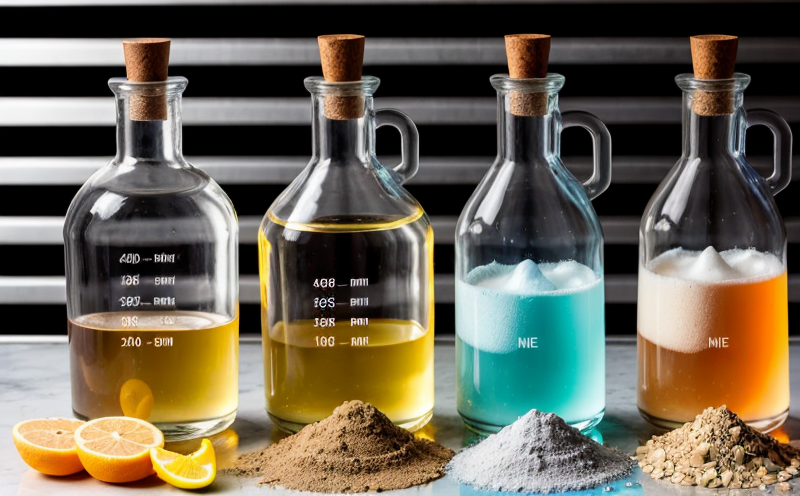ASTM F3146 Electrolyte Analysis of Lithium-Ion Cells
The American Society for Testing and Materials (ASTM) F3146-20 standard provides a comprehensive approach to the electrolyte analysis of lithium-ion cells. This test method is critical in ensuring the safety, performance, and reliability of lithium-ion batteries used across various sectors including automotive, aerospace, consumer electronics, and renewable energy systems.
The ASTM F3146-20 standard outlines procedures for determining the chemical composition and physical properties of electrolytes used in lithium-ion cells. The analysis covers a wide range of parameters such as pH levels, viscosity, ion concentration, and trace element content. Understanding these characteristics is essential for optimizing battery performance and ensuring compliance with regulatory standards.
The test method employs advanced analytical techniques like inductively coupled plasma-optical emission spectrometry (ICP-OES), capillary electrophoresis, and other spectroscopic methods to analyze the electrolyte components. These instruments provide precise measurements of elemental impurities, which can significantly impact battery life and safety.
The electrolyte plays a crucial role in enabling ion transport within the cell, affecting both the charging and discharging processes. By rigorously analyzing the electrolyte composition according to ASTM F3146-20, manufacturers can identify potential issues early on, ensuring that only high-quality cells reach commercial markets.
This service is particularly beneficial for quality managers, compliance officers, R&D engineers, and procurement professionals working with lithium-ion batteries. It helps them make informed decisions regarding material selection, process optimization, and product safety. The insights gained from this analysis can lead to improved battery performance, extended operational life, and enhanced user satisfaction.
The ASTM F3146-20 standard ensures that electrolytes meet the stringent requirements set forth by international standards such as ISO 12405 and IEC 62660. Compliance with these standards is increasingly becoming a necessity for manufacturers aiming to enter global markets or adhere to local regulations.
In summary, ASTM F3146-20 electrolyte analysis offers invaluable data that contributes to the development of safer, more efficient lithium-ion batteries. This service not only supports technical innovation but also plays a vital role in maintaining high standards of quality and reliability within the industry.
Why It Matters
The importance of ASTM F3146 electrolyte analysis cannot be overstated, especially given the growing demand for safer and more efficient lithium-ion batteries. Here are some key reasons why this test is crucial:
- Enhanced Safety: By identifying potential impurities early in the manufacturing process, manufacturers can prevent safety hazards associated with defective cells.
- Better Performance: Optimizing electrolyte composition leads to improved battery efficiency and longevity.
- Regulatory Compliance: Meeting international standards ensures that products meet specific performance benchmarks required by regulatory bodies.
- Market Differentiation: Offering superior quality batteries can set a company apart in competitive markets, attracting more customers.
- Environmental Impact: Ensuring electrolytes are free from harmful contaminants reduces the environmental impact of battery disposal and recycling.
- Cost Efficiency
The benefits extend beyond just technical improvements; they also contribute to sustainable practices and cost savings throughout the supply chain. By adhering to ASTM F3146-20, manufacturers can mitigate risks associated with poor quality materials while enhancing their reputation in the market.
Why Choose This Test
Selecting ASTM F3146 electrolyte analysis for your lithium-ion cells offers numerous advantages that go beyond mere compliance:
- Precision Measurements: Advanced analytical techniques ensure accurate readings of various electrolyte parameters.
- Comprehensive Coverage: The test method covers a broad spectrum of chemical and physical properties, providing a holistic view of the electrolyte's quality.
- International Standards: Compliance with ASTM F3146-20 ensures adherence to globally recognized benchmarks for battery safety and performance.
- Expertise and Experience: Our team of experts brings extensive knowledge in lithium-ion technology, ensuring reliable results every time.
- Rapid Turnaround: Efficient processes allow for timely delivery of reports, supporting quick decision-making.
- Custom Solutions: Tailored services meet specific customer needs, whether it's routine testing or one-off analysis projects.
- Cost-Effective: Long-term benefits outweigh initial costs, contributing to overall profitability and competitiveness.
Choosing ASTM F3146 electrolyte analysis not only enhances product quality but also strengthens your brand’s reputation in the industry. It demonstrates a commitment to excellence that resonates with discerning clients and stakeholders.
Quality and Reliability Assurance
Ensuring the highest standards of quality and reliability is at the core of our service offerings for ASTM F3146 electrolyte analysis. Here’s how we achieve this:
- State-of-the-Art Equipment: We utilize cutting-edge analytical instruments to perform precise measurements.
- Certified Laboratories: Our facilities are accredited to international standards, guaranteeing accuracy and consistency.
- Dedicated Experts: Highly trained professionals handle each sample meticulously, ensuring accurate results.
- Comprehensive Reporting: Detailed reports provide clear insights into the electrolyte composition and its implications for battery performance.
- Ongoing Training: Our staff regularly updates their skills through continuous professional development programs.
- Customer Collaboration: We work closely with clients to understand their unique requirements and deliver customized solutions.
Our unwavering focus on quality ensures that every analysis conducted meets the highest standards. By partnering with us, you can be confident in the reliability of your lithium-ion cells, knowing they have undergone thorough testing according to ASTM F3146-20 guidelines.





